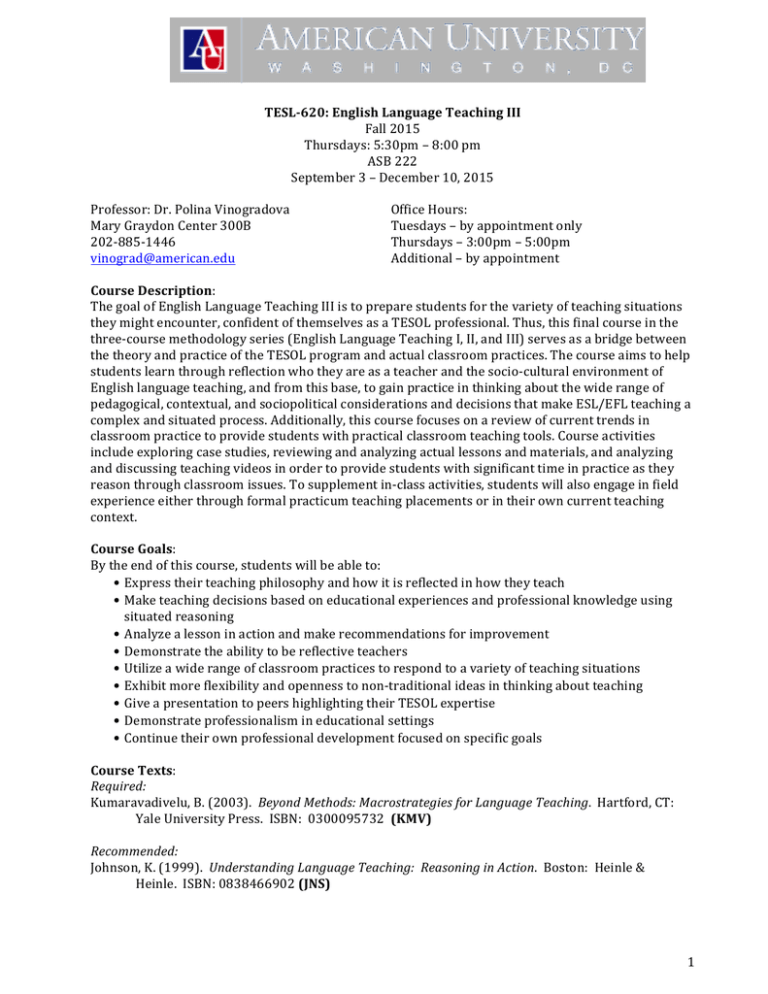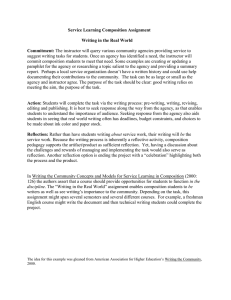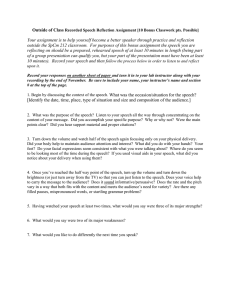Document 12913081
advertisement

TESL-­‐620: English Language Teaching III Fall 2015 Thursdays: 5:30pm – 8:00 pm ASB 222 September 3 – December 10, 2015 Professor: Dr. Polina Vinogradova Office Hours: Mary Graydon Center 300B Tuesdays – by appointment only 202-­‐885-­‐1446 Thursdays – 3:00pm – 5:00pm vinograd@american.edu Additional – by appointment Course Description: The goal of English Language Teaching III is to prepare students for the variety of teaching situations they might encounter, confident of themselves as a TESOL professional. Thus, this final course in the three-­‐course methodology series (English Language Teaching I, II, and III) serves as a bridge between the theory and practice of the TESOL program and actual classroom practices. The course aims to help students learn through reflection who they are as a teacher and the socio-­‐cultural environment of English language teaching, and from this base, to gain practice in thinking about the wide range of pedagogical, contextual, and sociopolitical considerations and decisions that make ESL/EFL teaching a complex and situated process. Additionally, this course focuses on a review of current trends in classroom practice to provide students with practical classroom teaching tools. Course activities include exploring case studies, reviewing and analyzing actual lessons and materials, and analyzing and discussing teaching videos in order to provide students with significant time in practice as they reason through classroom issues. To supplement in-­‐class activities, students will also engage in field experience either through formal practicum teaching placements or in their own current teaching context. Course Goals: By the end of this course, students will be able to: • Express their teaching philosophy and how it is reflected in how they teach • Make teaching decisions based on educational experiences and professional knowledge using situated reasoning • Analyze a lesson in action and make recommendations for improvement • Demonstrate the ability to be reflective teachers • Utilize a wide range of classroom practices to respond to a variety of teaching situations • Exhibit more flexibility and openness to non-­‐traditional ideas in thinking about teaching • Give a presentation to peers highlighting their TESOL expertise • Demonstrate professionalism in educational settings • Continue their own professional development focused on specific goals Course Texts: Required: Kumaravadivelu, B. (2003). Beyond Methods: Macrostrategies for Language Teaching. Hartford, CT: Yale University Press. ISBN: 0300095732 (KMV) Recommended: Johnson, K. (1999). Understanding Language Teaching: Reasoning in Action. Boston: Heinle & Heinle. ISBN: 0838466902 (JNS) 1 Richards, J.C. and Lockhart, C. (1996/2009). Reflective teaching in second language classrooms. Cambridge, UK: Cambridge University Press. ISBN: 0-­‐521-­‐45803-­‐X (RNL) Supplementary materials will be distributed as needed or be made available in Blackboard. Requirements: Attendance is key for course success, as is active class participation. You are required to complete all assigned readings and assignments before class. All work must be handed in by the due dates established; late work receives a 10% grade reduction per 24 hours late (not per class period late). No assignments will be accepted after 72 hours after the due date. Assignments have varying due dates as described below. Academic Integrity: All work submitted should be your own and should be original and created for this class. No modified work or work submitted for another class or another assignment will be accepted. You are subject to the Academic Integrity Code of American University. See http://www.american.edu/academics/integrity/code.cfm for more information. Assignment Descriptions and Due Dates: Individual Reflective Journals (13 total) Due every Thursday by 12am Part of teacher reflective practices is keeping a journal to reflect on various aspects of your teaching and learning as a teacher. This semester, you will engage in these reflective practices by writing a weekly journal following journal prompts to engage with the course material and connect it with your practicum experience. Your journal entries should be 250-­‐500 words long, typed, single-­‐spaced. Please write every journal entry in a word document, save, and upload as a word file. Submit via Blackboard every Thursday by 12:00am. Discussion Board Posts (13 total) Due every Thursday by 12am Every week, a discussion prompt will be posted onto Blackboard Discussion Board (DB) by 5:00 p.m. Thursday. Students are required to engage in the online conversation at least once by 12:00 a.m. Sunday and a second time by 12:00 a.m. Thursday of the following week. This is another opportunity to learn from your classmates, share ideas, engage with the course material, and reflect on your own teaching and learning. Please keep you posts to 150 words max and make sure to respond to your classmates’ questions to you. Please keep the discussion robust, substantiated, and informative. Teacher Autobiography Due: 9/10 Part of being a reflective teacher is understanding how we became teachers and what experiences influence us in the classroom. Following the instructions for this assignment in Understanding Language Teaching (JNS, p. 25-­‐26), your Teacher Autobiography will have three parts: reflection, critical analysis, and (current or future) application. It should be 2-­‐3 pages in length, typed, single-­‐ spaced. Submit via Blackboard before class on Sept. 10. Teaching Context Report Due: 9/24 Whether working with a host instructor or in your own classroom, this report will serve as an in-­‐depth analysis of your teaching context including the student audience and the curriculum. Building upon the teaching contexts reports you have written for ELT I and II, you will expand the information about the students (in a section entitled Student Needs and Background) and about the curriculum (Curriculum Details). Through observation, discussions with the host or other instructors, and data about the students (where possible), describe the students’ general background and needs. Include such information as the students’ L1, educational background, time in the U.S. or other English-­‐ speaking environments, proficiency in English, attitudes toward English and English speakers, socioeconomic status, classroom expectations, and their level of L1 and L2 literacy. In addition, 2 interview one student and describe in detail his/her needs and background following Freeman (2011) as a model. In the 2nd section, include such information as who designed the curriculum, what methodological principles drive the curriculum, the history of the current curriculum, how the curriculum of this course relates to other courses in the program, what text or other materials are used and why they were chosen, and who the other stakeholders are affected by the curriculum beyond the instructor and the students. Finally, include an analysis of how the preceding information will help you as you prepare and teach your lessons. The total report should be 5-­‐7 typed single-­‐ spaced pages, depending on the number and variety of students. Submit via Blackboard before class on Sept. 24. Host Instructor’s Teaching Beliefs, Values, and Practices Report Due: 10/01 For this report, you will observe your host instructor (optionally using Woodward’s 4-­‐column analysis observation form). Using the information gathered through the observation, conversations with the instructor, and subsequent reflection, complete the Host Instructor’s Teaching Beliefs, Values, and Practices report. This 2-­‐3 typed single-­‐spaced report should include a summary of the values and beliefs observed through the classroom practices and a reflection on how well the observed values and beliefs match your own. Finally, describe how you have or will have to adapt to work successfully with the host instructor. Submit the report via Blackboard before class on Oct. 1. Teaching Philosophy Due: 10/8 Your teaching philosophy describes your beliefs about education in general, languages, language learning, and teaching, including the role of the teacher. It should be clear and concise, and no more than 1 page in length (typed, single-­‐spaced). A draft is due on September 11 for those who desire feedback. Submit via Blackboard before class on Oct. 8. Lesson Plans (2 total) Due: 10/15, 10/29 Lesson plans should be written for your practicum or current teaching context. For each lesson plan, include a description of the teaching context, the learners, and the course (drawn from the Teaching Context Report), the lesson objectives, step-­‐by-­‐step learning activities, and an assessment. A lesson plan template is provided on Blackboard. You will have the opportunity to get peer feedback on your lesson plans before turning them in. On those days (10/8 and 10/22), bring two hard copies of your lesson plan drafts. These lesson plans will also be used for the two Teaching Videos and Reflections. Note: You may not submit lesson plans that have been previously submitted for another class nor can you modify a lesson plan found online. Submit the final lesson plans via Blackboard before class on Oct. 15 (Lesson Plan 1) and Oct. 29 (Lesson Plan 2). Teaching Videos and Reflections Due: 10/22 and 11/5; 10/29 and 11/12 Based on the two lesson plans developed for this class, the Teaching Videos and Reflections should be seen as a complete process from designing the lessons, peer feedback on the lessons, videotaping the lessons, viewing the lessons for peer-­‐ and instructor-­‐feedback, and reflecting on the lessons. Videotape yourself teaching the full lessons in both cases but then watch the videos before class on your assigned critique day and choose a 30-­‐minute segment to showcase. Note: If the videotaping does not work for any reason, you will have to record again so you have two videos. Write a preliminary reflection and critique of your teaching before class each time and be prepared for your instructor’s and classmates’ critique. After the critiques, revise and extend your reflection based on the feedback given. Please keep in mind that the reflection should be well-­‐grounded in theory and research as well as the practice and experience. The reflection should be 3-­‐5 typed, singled-­‐spaced pages. Submit to your instructor the Teaching Videos on Oct. 22 (Video I) and Nov. 5 (Video II). Submit the Reflections via Blackboard by Oct. 29 (Reflection I) and Nov. 12 (Reflection II). 3 Class Logs and Reflection Due: 11/19 Throughout the teaching practicum or teaching in your classroom, you should keep class logs (see Practicum Handbook for more details). Three of these should be formal and submitted with a reflection on what was learned from them. Submit via Blackboard before class on Nov. 12. Conference Presentation Due: 11/16 (Abstract), 12/3 (Presentation) For this assignment, you will prepare a 10-­‐minute presentation based on a paper you have previously written for this program, a project you have completed for this program, or another topic approved by the instructor. You will submit an official conference abstract (100 words maximum) outlining the topic for approval by Nov. 14. Presentations will be given during a special in-­‐class conference on December 5 and other TESOL program students, staff and faculty will be invited to attend. Complete the call for proposal form and email it with the abstract to vinograd@american.edu before midnight on Nov. 15/16. Professional Development Plan Due: 11/19 This action plan for your own continued professional development should be 2-­‐4 pages (single-­‐ spaced) and should include short-­‐term (within 1 year) and long-­‐term (within 5 years) goals. Outline the steps you will take to achieve these goals. Reflect on any possible obstacles and how you will overcome them. Submit via Blackboard before class on Nov. 19. Final Reflective Report Due: 12/10 By the last day of class, you will submit a final reflective report about your learning process and progress as a teacher during this course. What are you aware of now as a teacher that you were not aware of at the beginning of this course and your practicum? What is important to you now that wasn’t before? How can you use that information to improve as a teacher? Also include what you see as your strengths and weaknesses as a language teacher, the progress you made throughout this course and the practicum (if applicable), and how this class and the practicum (if applicable) affected you both positively and negatively. Submit via Blackboard before class on Dec. 10. Evaluation: Weekly Journals 5% Weekly BB Discussions 5% Teacher Autobiography 5% Teaching Context Report 10% Host Instructor Report 10% Teaching Philosophy 5% Lesson plans (2) 15% Class Logs and Reflection (3) 5% Teaching Videos and Reflections (2) 15% Professional Development Plan 5% Conference Presentation 10% Final Reflective Report 10% Total 100% Grading Scale for All Assignments: 94-­‐100 A 77-­‐79 C+ 90-­‐93 A-­‐ 74-­‐76 C 87-­‐89 B+ 70-­‐73 C-­‐ 84-­‐86 B 65-­‐69 D 80-­‐83 B-­‐ A grade below B is not a passing grade in this class. 4 Class Schedule Overview: Date Topic Unit 1: The Actors 9/3 Teacher identities and roles Teaching as a reflective practice Pre-­‐class online survey 9/10 Readings (To be completed by class period) Assignments (Due before class period) JNS Ch. 1, 2 KMV Ch. 1 TESOL Practicum Handbook Establish contact with your practicum host instructor Teacher Autobiography Journal 1 DB 1 Learner identities and roles (and parents) Sociocultural nature of teaching and learning RNL Ch. 3 Auerbach (2000) Freeman (2011) Wenger (1998) 9/17 Administrators and policies in different JNS Ch. 3 teaching contexts Canagarajah (1999) ESL/EFL teaching in society Menken (2008) Policies and policymakers Nieto (2010) Rosenthal (2012) Webinar 9/24 Critical language awareness Alim (2010) or Janks (2008) Advocating for students Grill (2010) Kangas (1995) or Lippi-­‐Green (1997) Phillipson & Skutnabb-­‐Reeves (2004) Unit 2: The Actions 10/1 Postmethod pedagogy JNS Ch. 4 Maximizing learning opportunities KMV Ch. 2, 3 Classroom Interactions 10/8 Lesson plan 1 workshop KMV Ch. 4, 5, 6 Minimizing perceptual mismatches Facilitating negotiated interaction Promoting learner autonomy 10/15 Intuitive heuristics KMV Ch. 7, 8, 9 Contextualizing linguistic input Yang (2003) Consciousness raising 10/22 Integrating language skills KMV Ch. 10, 11, 12 Ensuring social relevance Raising cultural consciousness Journal 2 DB 2 Teaching Context Report Journal 3 DB 3 Host Instructor Report Journal 4 DB 4 Teaching Philosophy Lesson Plan 1 (draft) Journal 5 DB 5 Lesson Plan 1 Journal 6 DB 6 Lesson Plan 2 (draft) Teaching Video 1 Journal 7 DB 7 Teaching Video 1 critiques 10/29 Individual student conferences via Skype during the weeks of October 21-26: Individual 30 minute appointments to discuss lesson plans and teaching videos Teaching Video 1 Reflection Lesson Plan 2 Journal 8 DB 8 5 11/5 Monitoring teaching acts Action research • Peer video feedback Unit 3: Going Beyond 11/12 Becoming a contributing professional I Guest speaker – John Mark King (Dept. of State) Conference presentations 11/19 11/26 12/3 12/10 KMV Ch. 13 Burns (2005) Gray (2012) Gunn (2010) Teaching Video 2 Journal 9 DB 9 Crandall (2001) Forhan & Scheraga (2000) Lorimer & Schulte (2012) Teaching Video 2 Reflection Journal 10 DB 10 Conference Abstract due Monday, Nov. 16 Class Logs and Reflection Professional Development Plan Journal 11 DB 11 Employment issues • Avoiding burn-­‐out • NNES teachers • Interviewing • Resumes, CVs, and cover letters Sign-­‐up for interviews – optional No Class: Thanksgiving Holiday Class Conference Clark (2003) Selvi (2010) or Valdes (1998) Sung (2012) CV Documents Class wrap-­‐up Post-­‐class online survey n/a Conference Presentation Journal 12 DB 12 Final Reflection Journal 13 DB 13 6

